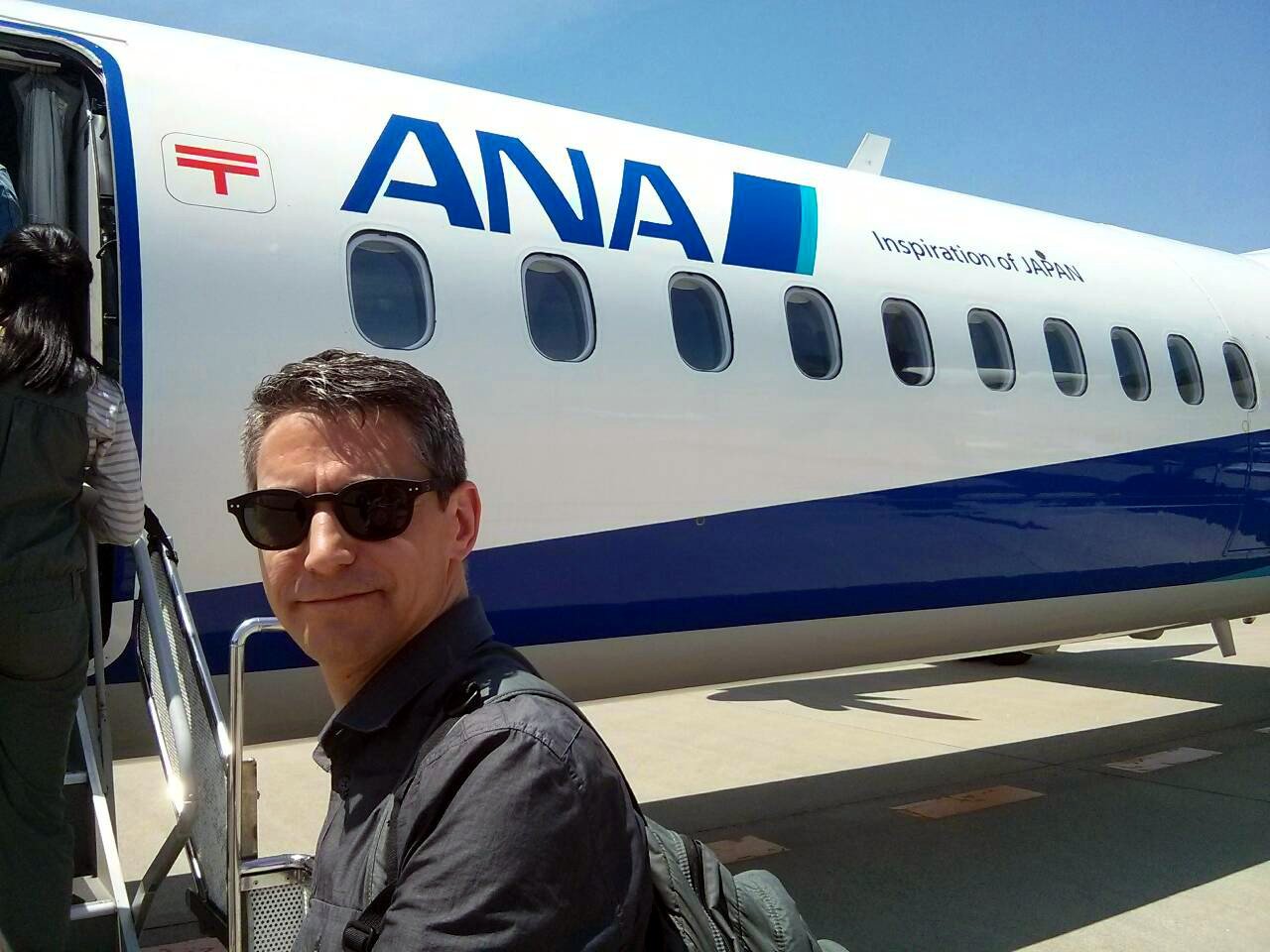This interview is part of a new series where I interview readers of AVO Magazine about their first trip to Japan. A while back I posted a message that asked for those who are interested to be interviewed about their first Japan trip, and I got a message from Rob who owns a website called The Real Japan. Even though his first trip was years ago, he was up for it to answer the questions I prepared for this new interview series. Read how Rob got interested in Japan, what he did in Japan, and of course what his first impression was of Japan.
AVO: Let’s start with the most important one: when, how long and with who did you go to Japan for the first time?
Rob: It was in February 2000. I was there for just over two weeks. I went with my Japanese wife (then my girlfriend).
AVO: How did you prepare for your trip to Japan?
Rob: At that time I was working in London the the UK Copyright Licensing Agency. It had a Japanese counterpart in Tokyo, and so I managed to agree between my employer and the Japanese Agency to get a couple of days on business on expenses including travel to Tokyo – so that helped with managing costs.
It also meant I got to go to Tokyo, which I otherwise wouldn’t have seen as my wife’s parents lived near Kobe – so I had no need to fly into Tokyo (we flew into Kansai International Airport near Osaka).
Much of what I knew about Japan at that stage I learned from reading books. I spoke very little Japanese. I had studied Japanese for a while some years before but that was mostly self-taught from books and audio tapes. So for the trip I bought a Berlitz Japanese phrase book.
Other than that, I didn’t do a great deal of pre-planning. My wife has worked in the travel industry, so she coordinated and booked the main travel plans like our flights. We did use a Japanese travel agent to book a trip to Hokkaido.
AVO: What made you decide to go to Japan? What attracted you?
Rob: I’d been fascinated with Japan and Japanese culture from a very young age. I was a big horror and science fiction film fan and remember watching old Godzilla movies on TV! That was possibly my first exposure to Japan.
I think it was the James Bond film You Only Live Twice – set in Japan – that first really struck a chord with me and got me on the long journey of my love of the country and its culture. I first saw it on TV in England, subsequently read the book, and then actually went to some of the locations in Japan where it was filmed.
The thing that finally convinced me it was time to go to Japan was meeting my Japanese girlfriend (we were penpals for a number of years before we actually met). She came to study English in the UK and was returning to Japan every year to see her family. So I guess I just kind of tagged along!
AVO: After you arrived in Japan: what was your first impression?
Rob: I loved it instantly! It was just as I imagined it would be. I remember thinking a lot of the buildings, infrastructure and landscapes reminded of the TV series Thunderbirds – a science fiction show made in the late 1960s with puppets. (I later found out that Thunderbirds was popular in Japan – I can understand why!)
Things I didn’t expect though were seeing so many signs in English, especially on the roads, on trains at train stations. The same goes for announcements in English on public transport. I knew only a little Japanese and feared I might be largely unable to travel on my own. It may have been that, in my mind, I was already well-attuned to Japanese society, but I was surprised at how manageable it was to get around and do the basic, day to day, things.
The other thing that struck me was how clean and tidy everything was – particularly in public places.
AVO: Did you choose a hotel, hostel, guesthouse, ryokan or a different place to sleep; why did you choose this option and how did you like it?
Rob: We used my in-law’s place as the base for our trip. I really liked that as although the building itself was quite modern the interior was more traditional style. So, all the rooms had tatami mats on the floor. The walls had shoji sliding doors, and we slept on futons. But we had air-conditioning – so kind of the best of the traditional and modern I guess.
I then had a couple of days on business in Tokyo, with my employer back in the UK paid for my travel and expenses, so I had a night in a business hotel. The room wasn’t huge but as I only used it to sleep that was fine. Like a lot of business hotels, the bed was western style – as was the toilet – which was a relief!
We travelled whilst we were there too and I was determined to stay in a ryokan (traditional inn) as part of that. We stayed one night in a ryokan. And as much as I’d loved Japan so far, it was staying in a ryokan for the first time that truly made me feel like I understood what Japan was all about. Ryokan can work out a bit more expensive than other accommodation but in my view they are worth every yen.
For me, nothing gets you closer to the real Japan than staying in a ryokan. I love them and try to stay in at least one every time we go travelling in Japan.
AVO: What did you do to get rid of your jet lag? Or to prevent this entirely?
Rob: I didn’t think much about jet lag. I was just so excited to be going to Japan, that it was very low on my list of things to think about!
As it happens, I do quite often get jet lag and have since learned that the best way for me to avoid it is to get a departure time in the evening, to stay awake as much as possible throughout the flight. The UK is 9 hours behind Japan time, with the flight time from the UK to Japan typically between 11-12 hours.
That means ideally flying out around 7 pm in the evening, staying awake throughout, and arriving the next morning in Japan. I then do my best to stay awake during the first day in Japan. Maybe going to be just a little earlier than I normally would to catch up on a little more sleep. So, by the following morning (day 2) in Japan my body is basically in rhythm with the local time.
I also tend to eat lighter in-fight meals and not drink too much alcohol during the flight – which is supposed to help.
AVO: Did you pick a route to take during your first trip in Japan, or did you stay in one place? And why?
Rob: My starting point (both literally and figuratively) was Kobe where my wife’s parents live. The basic plan was to fly from the UK direct to Kansai International Airport near Osaka, as that’s the closest international hub to Kobe. I had a few days in Kobe, where I could rely on my wife and her family to make me feel at home and ‘ease me into’ Japan. It was helpful to feel ‘grounded’ a bit before the rest of my trip.
The next part was my business trip to Tokyo, which I did solo. So I caught a local train from Kobe to Osaka, then a shinkansen from Osaka to Tokyo. Had two days working in Tokyo, staying one night, before returning to Osaka, again by shinkansen.
For the rest of my 10 days or so left, we used Kobe as our base but then did a few day trips and a few days in Hokkaido.
AVO: How did you handle your budget? Did you set a budget beforehand and did you manage to keep it?
Rob: It was so long ago I have difficulty remembering just how I budgeted. Like most everyone going to Japan for the first time though, I presumed it was going to be really expensive when, in fact, it wasn’t always as costly as I imagined it would be. Of course, a big saving for me was staying with family, which helped to minimise our accommodation costs, a bit part of most travelling expense.
One very practical thing I did, and still do to this day, was to make a ‘ready reckoner’ or currency conversion chart. I printed this onto a sticker and stuck that onto a card in my wallet. Any time I needed to check the price of something, compared with the UK, I just flipped open my wallet and I could see either an exact or approximate estimate of the cost.
I struggle with mathematics (I’m kind of math dyslexic) so this very simple thing I found really useful and helpful. These days, due to the drop in the value of sterling (£) it is easier to mentally do the conversion – but I preferred it when things were much cheaper in Japan!
AVO: What stood out to you the most during your trip?
Rob: How ordered Japanese society is. I don’t necessarily mean in a negative, constrained way, but there was an order to everything and to everyone that just meant everything seemed to work and function smoothly.
I read a great analogy in a book about Japan (I can’t remember which one it was though!) that described how in cities like Tokyo, where there are millions of people going about their everyday lives, that in spite of their numbers, they seem to flow around each other like liquid mercury. There’s never any friction or disorder. Japanese society just works.
AVO: What is your best memory from your first trip to Japan?
Rob: Probably getting a personally-escorted, behind-the-scenes tour of the National Museum in Tokyo. It was completely unexpected. One of the business contacts I was working with in Tokyo must have either been connected to the museum or had friends in high places. He asked me what I wanted to do one afternoon after finishing work, and I said visit the National Museum.
He took me there, we went inside, he asked me what it was I most wanted to see. So, I told him I wanted to see their collection of samurai armour. Whereupon, he walked me through a hidden door and literally behind the scenes, along corridors, up and down stairs, before popping out at the other end in the gallery where the samurai armour was. It continued like that for a couple of hours. It was amazing!
I wrote a blog post about that experience.
AVO: Was there something that (really) disappointed you about Japan?
Rob: I can honestly say I wasn’t really disappointed by anything about Japan! As I’ve gotten to know it better down the years there are a few aspects that (like every society) I think could be improved for the better. But, overall, it’s as near to perfect a country as I found!
AVO: Did you feel like you experienced some kind of a culture shock during your first visit to Japan, despite all the knowledge about Japan and all the preparations you took for your trip? (Do you think you prepared well enough?)
Rob: I felt no culture shock whatsoever. Quite the opposite, in fact.
I think because I’d been immersing myself in Japanese culture for so many years before first going, it turned out to be just like I’d imagined it would be. I felt entirely at home there. The weird thing was, when I returned to England, for weeks afterwards I felt like uneasy, unsettled, like I was on holiday and Japan had been my home – rather than the other way around! I knew immediately upon my return to the UK that I’d be going back to Japan for many years to come.
AVO: Which place is THE place everyone should visit according to you, and why?
Rob: That’s kind of difficult to answer, because my philosophy of travel is to do what you want to do (and go where you want to go), not what others do or tell you to. Of course, it’s always great to hear of other people’s adventures, and to get ideas and inspiration from books, blogs etc. Which is why I started my blog TheRealJapan.com.
Having said that, I know that travelling to Japan for the first time is a big deal and that people will want to ensure they’ve built in some unforgettable experiences. Travel, for me, is not about ticking off a long list of popular sights, one after the other. I’m more interested in experiences than places.
So, with that in mind, there is one experience I always recommend whenever people are going to Japan – especially for the first time – and that is to stay in a ryokan (traditional inn). There’s nothing else like it, in my view, in getting to the heart of what Japan is all about.
AVO: What tip(s) do you want to share with everyone who still wants to take a vacation to Japan and has never been to Japan before?
Rob: In keeping with my idea of travelling primarily for experiences that create lasting memories, I always recommend thinking about why you really want to go to Japan. To think about the memories you’d love to have after you’ve returned home. And use that as a basis for working backwards to plan the sort of journey that provides you with those opportunities to create those memories.
My other major tip is not to spend too much time in Tokyo. By all means, visit the capital of Japan – it is an incredible city. But Tokyo isn’t Japan in just the same why that London isn’t England, or Washington isn’t the USA. It is a lot easier to travel internally in Japan than people often think.
Also, the recent increase in the number of low-cost carrier airlines in Japan has made flying internally really affordable, cheap even. It can be much cheaper than travelling by train. This makes it easy to visit islands other than the main island of Honshu – where Tokyo, Kyoto, Hiroshima, Osaka and all the other major cities that foreigners.
If you can only stretch to visiting one island other than Honshu I’d recommend the southern island of Kyushu, where you’ll find Nagasaki (a wonderful city), Kagoshima, Kumamoto and some stunning volcanic landscapes.
I’d also recommend they enrol on my free mini-course entitled How To Plan An Amazing Trip To Japan! More details on it can be found here. 🙂
AVO: What was it like to come home after your first trip to Japan?
Rob: Depressing! As I mentioned earlier, when I returned to England, for weeks afterwards I felt like uneasy, unsettled, like I was on holiday and Japan had been my home – rather than the other way around.
I really didn’t want to leave Japan. I wanted to stay for as long as possible – only it wasn’t possible! I knew immediately upon my return to the UK that I’d be going back to Japan for the rest of my life.
AVO: What do you miss the most now you’ve returned from Japan?
Rob: The civility of every day life.
AVO: Do you plan on going back to Japan?
Rob: Absolutely! I’ve been going back every year, bar one, for the past 17 years and will continue to do so! I’ll keep posting details of my adventures on my blog at TheRealJapan.com so if anyone is interested they can follow along.
I want to thank Rob for his time to answer all these questions extensively, while his first trip has been years ago! Please check out his very interesting website TheRealJapan.com, as it contains many interesting articles about Japan and he, for example, offers a free Guide to Amazing Adventures in Japan.
Keep an eye on AVO Magazine, as there will be more ‘First time in Japan’ interviews coming up!





















Thanks for the interview Fran! Your AVO Blog is EPIC!
Your questions were really thought-provoking. It made me realise just how much and why I love Japan so much.
I look forward to reading more interviews in this series � I think it�s a terrific idea!
Rob
Interesting read! Look forward to the other interviews!